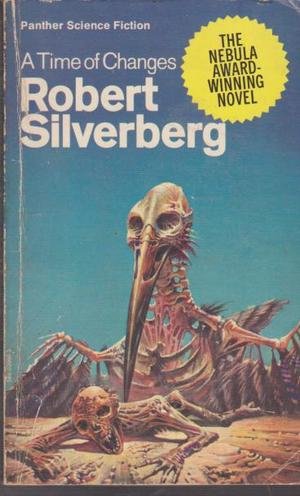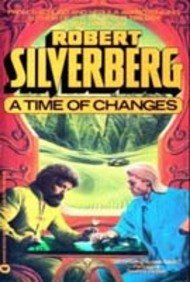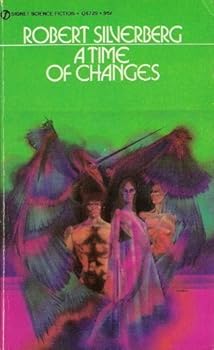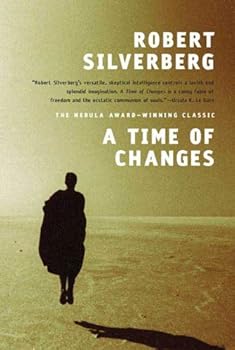![]() A Time of Changes by Robert Silverberg
A Time of Changes by Robert Silverberg
 After four years of successive losses, sci-fi great Robert Silverberg finally picked up his first Nebula Award in 1972. His 1967 novel Thorns had lost to Samuel R. Delany‘s The Einstein Intersection, his brilliant 1968 novel The Masks of Time had been bested by Alexei Panshin‘s equally brilliant Rite of Passage, 1969’s time travel tale Up the Line had succumbed to Ursula K. Le Guin‘s The Left Hand of Darkness, while 1970’s unforgettable Tower of Glass had been beaten by Larry Niven‘s Ringworld.
After four years of successive losses, sci-fi great Robert Silverberg finally picked up his first Nebula Award in 1972. His 1967 novel Thorns had lost to Samuel R. Delany‘s The Einstein Intersection, his brilliant 1968 novel The Masks of Time had been bested by Alexei Panshin‘s equally brilliant Rite of Passage, 1969’s time travel tale Up the Line had succumbed to Ursula K. Le Guin‘s The Left Hand of Darkness, while 1970’s unforgettable Tower of Glass had been beaten by Larry Niven‘s Ringworld.
But in 1972, Silverberg finally copped the top prize given out by the Science Fiction and Fantasy Writers of America, winning for his superb novel A Time of Changes and prevailing over Le Guin’s The Lathe of Heaven and novels by Kate Wilhelm, Poul Anderson, T.J. Bass and R.A. Lafferty. (A Time of Changes was also nominated for the Hugo Award, ultimately losing to Philip Jose Farmer‘s To Your Scattered Bodies Go.)
Originally appearing in the March – May ’71 issues of Galaxy magazine, A Time of Changes was released as a hardcover book in June of that year, and in conjunction with the author’s three other remarkable novels of 1971 — The Second Trip, Son of Man and The World Inside — demonstrate what a tremendous roll Silverberg was on during this phase of his lengthy career.
A Time of Changes takes the form of a memoir written by the fugitive prince Kinnall Darival, who pens his story in the desertlike Burnt Lowlands of the planet Borthan, at least 1,000 years from today. Darival is currently the most wanted man on the planet, and his story explains why.
First settled by Earthmen a millennium earlier, Borthan — or, at least, Velada Borthan, the only continent that has been civilized — is now a society run in conformity with the dictates of their “Covenant.” It is a society that severely frowns on any demonstration of the self. Speaking of one’s feelings to another has been proscribed, to the point that even the use of such words as “I” and “myself” are deemed more offensive than the 21st century “F bomb.” Indeed, one may only speak of such intimate matters to one’s bondsister or bondbrother (everyone, apparently, gets two) or to the professional “drainers,” who, in their quasi-religious manner, seem to combine the attributes of both analyst and paid confessor.
As Darival tells us from his crumbling shack in the middle of the burning desert, he had been forced to leave his province of Salla when his older brother, Stirron, had assumed the position of septarch, following the death of their father. He had found little welcome in the northern, ascetic province of Glin, and so had worked his way down to the southern, tropical province of Manneran, where he had wed the look-alike cousin of his bondsister Halum (who he’d been shamefully in love with), raised a family and risen to a position of prominence.
All was going well with him until he’d encountered the roving Earthman named Schweiz, who made him realize what a repressive society he lived in, and with whom he’d partaken of a drug from the uncivilized southern continent of Sumara Borthan, which enabled its users to enter one another’s minds and (gasp!) share feelings.
And Darival’s crimes were only compounded when, in company with Schweiz, he’d traveled to the unknown continent to get more of the drug, and come back to “turn on” the populace to a new covenant of love, feelings and mutual understanding.
A Time of Changes is a beautifully written book, and as it turns out, Kinnall Darival is almost as good a writer as Silverberg himself (LOL!). He is an immensely likable and self-effacing man, imposing physically yet constantly telling the reader about his perceived “shortcomings” (such as his premature ejaculation problem), and his slow conversion from upright observer of the puritanical Covenant to a messiah of free love is wonderful to behold.
The world of Borthan is meticulously described by the author, down to its history, geography, customs, flora and fauna, and can almost be seen as a warm-up for Silverberg’s most elaborately detailed planet, Majipoor (although it took him eight novels and change to flesh out THAT world fully).
Very much a novel of its time, with its emphasis on drugs and “soul sharing” and the liberating power of love, A Time of Changes retains its great effectiveness today, over four decades later.
As for that Sumaran drug, it is described in a manner that forcefully brings to mind LSD, especially when Kinnall and Schweiz spill the powder into some wine, drink it down, and wait a 1/2 hour or so for the effects to manifest. Those initial effects DO seem reminiscent of the lysergic experience, too, although no acid that I have ever heard of, unfortunately, enabled soul-to-soul telepathy between its users. A pity.
As in Son of Man (an extremely psychedelic, borderline unreadable book that makes one wonder about the extent of Silverberg’s own drug experiments during that period!), our lead character here gets to know what it feels like to be a woman (by doing the drug with his mistress); as does the telepath David Selig in the author’s 1972 novel Dying Inside, our lead character also gets to experience a “double orgasm” (while doing the drug and having sex with that same woman).
The book is absolutely compelling, fascinating and charming; a true “page-turner” that even contains some traces of genuine humor (in an apparent nod to Star Trek, the shipmaster who takes Kinnall and Schweiz to the southern continent is named… Capt. Khrisch!).
“My prose has its faults,” Darival tells us at one point in his history, but there were certainly none that this reader could discern. In all, this is yet another wonderful creation from Mr. Silverberg, one of the best of the 15 or so that I have read so far, and surely deserving of that Nebula Award. To put it succinctly, and in a phrase that would surely shock and appall most of the inhabitants of Velada Borthan, “As for myself, I loved it!”
~Sandy Ferber
![]() A Time of Changes is one of Robert Silverberg’s best novels from his most prolific and creative period in the late 1960s/early 1970s, along with Downward to the Earth and Dying Inside. Once again, Sandy’s review is both excellent and comprehensive, so I can only add my personal impressions.
A Time of Changes is one of Robert Silverberg’s best novels from his most prolific and creative period in the late 1960s/early 1970s, along with Downward to the Earth and Dying Inside. Once again, Sandy’s review is both excellent and comprehensive, so I can only add my personal impressions.
In many ways, this book resembled Evgeny Zamyatin’s We (1924) and Ayn Rand’s Anthem (1938) since it depicted a repressive society that demonizes the individual, venerates the group, and suppresses private feelings. In both books, the concept of “I” is forbidden, and people have numbers in place of names. However, those early dystopian classics were written by Russian emigrants who had escaped oppressive totalitarian regimes, and forcibly showed the dangers of suppressing free will and individualism.
A Time of Changes, on the other hand, is a book that exhorts the reader to “love oneself so you can love others, and vice versa.” In a repressed society such as Borthan, it takes a mind-expanding drug from the southern jungles to open people’s minds and create a telepathic link between individuals. This allows them to escape the prison of their minds and find a way to love themselves and others. It’s a very 1960s/1970s theme. Meanwhile, Anthem came to a radically different conclusion, the famous philosophy of objectivity, which emphasized self-interest, reason, and individual freedom.
Meanwhile, while reading A Time of Changes, I was also strongly reminded of Ursula K. LeGuin’s The Left Hand of Darkness. Both novels are set on distant planets settled by humanity but relatively isolated and somewhat undeveloped technologically. In LeGuin’s Gethen, the population consists of hermaphrodites that assume male and female aspects only when in heat (“kemmer”). When a human envoy named Genly Ai arrives, he goes through great difficulties understanding their cultures and recognizing his own shortcomings and gender biases. The plot has a lot of similarities as Genly’s companion Estraven is a powerful bureaucrat that is forced into exile and must hide in various guises as he travels to various kingdoms. This is similar to Kinnall Darival’s story, the second son of a septarch who must go into exile and disguise himself for political reasons at first, and later because he tries to spread the seditious new religion of self-discovery.  Both books are journeys of self-discovery featuring spiritual awakenings and capture the spirit of the late 1960s/early 1970s.
Both books are journeys of self-discovery featuring spiritual awakenings and capture the spirit of the late 1960s/early 1970s.
~Stuart Starosta
![]() Another beautifully written novel by Robert Silverberg, deserving of its Nebula Award. I recommend Blackstone Audio’s version narrated by Tom Parker (an alias of Grover Gardner, one of my favorite narrators).
Another beautifully written novel by Robert Silverberg, deserving of its Nebula Award. I recommend Blackstone Audio’s version narrated by Tom Parker (an alias of Grover Gardner, one of my favorite narrators).
~Kat Hooper





“… and his slow conversion from upright observer of the puritanical Covenant to a messiah of free love is wonderful to behold.”
Oh, my gosh, it’s the 1970s all right!
Seriously,Sandy, thank you for introducing me to some Silverberg books that I missed while I was reading LeGuin, Panshin and Wilhelm. Seriously. I read one of two of the “New Wave” books, but they didn’t connect with me at the time, and I tend to think of him as Majipoor and (I think) a futuristic, global book called *Shadrach in the Furnace* (?) This looks like a good one to track down to get a sense of Silverberg in his prime.
As a side note, I thought there were two authors of *Rite of Passage*, two brothers?? Do I have that wrong?
Always glad to be of assistance, Marion! As far as the “Rite of Passage” book, as far as I know, it was just Alexei Panshin who wrote it; at least, his is the only name that appears on my copy at home. BTW, I just finished reading “Shadrach in the Furnace” and just loved it. I doubt that my upcoming review for this one will be able to do it justice….
I probably have the *Rite of Passage* thing wrong. It was nearly **coughs discreetly** years ago, after all.
And now, for something completely off-topic… Panshin co-wrote another book with Cory Panshin; apparently not brother, but wife. Other than having every single fact wrong, I did okay on that one.
Marion, any chance you were thinking of Boris and Arkady Strugatsky’s 1972 book Roadside Picnic? I’ll be reading that one pretty soon, and plan to watch the 1979 Tarkovsky film Stalker which is based on it.